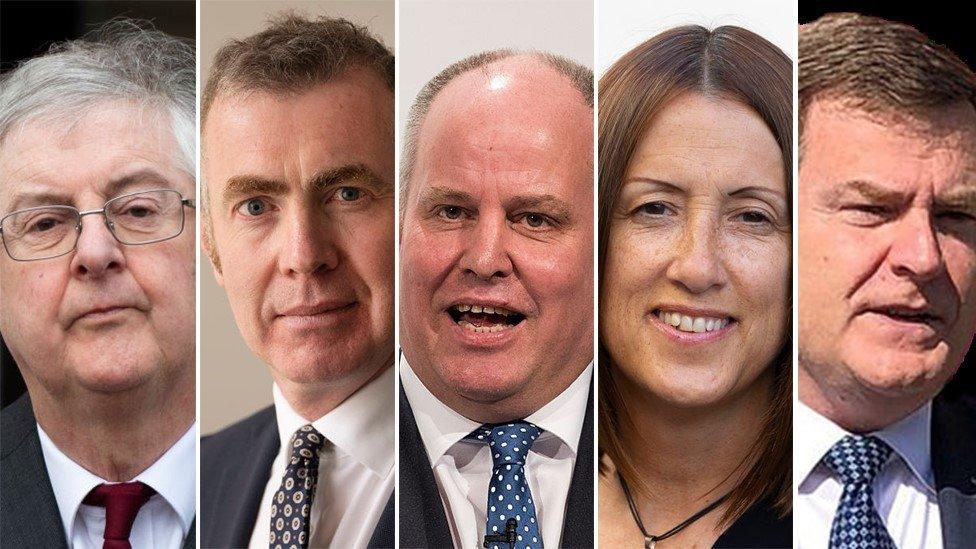Covid: Leaders clash on business support ahead of election
- Published
Wales' party leaders clash ahead of the election
Welsh party leaders have clashed on the Welsh government's pandemic support for businesses in a BBC election debate.
Labour's Mark Drakeford said £200m was waiting to be spent by the next first minister after the election to give firms hit by the pandemic more help.
But Plaid Cymru's Adam Price questioned why it could not have been spent before the vote on 6 May.
Conservative Andrew RT Davies said there was unallocated cash in Welsh government coffers.
And Jane Dodds said the Welsh Liberal Democrats would support medium, small and micro-businesses.
Meanwhile Abolish the Welsh Assembly Party's (ATWAP) Richard Suchorzewski said firms should be given rent relief to encourage them to open up.
The five appeared in the BBC Wales Leaders' Debate on Thursday evening, a week before the Welsh Parliament election on 6 May.

SIGN UP FOR WALES ALERTS: Get extra updates on BBC election coverage

Welsh Labour leader Mark Drakeford told the debate his government had set aside £200m "as a down payment to go on helping businesses straight after the election".
"Whoever is in government, whichever one of us on this platform is first minister after next Thursday, there will be proposals waiting on the desk for them to spend that money to support businesses."
But Mr Price questioned why Mr Drakeford was waiting until after the election.
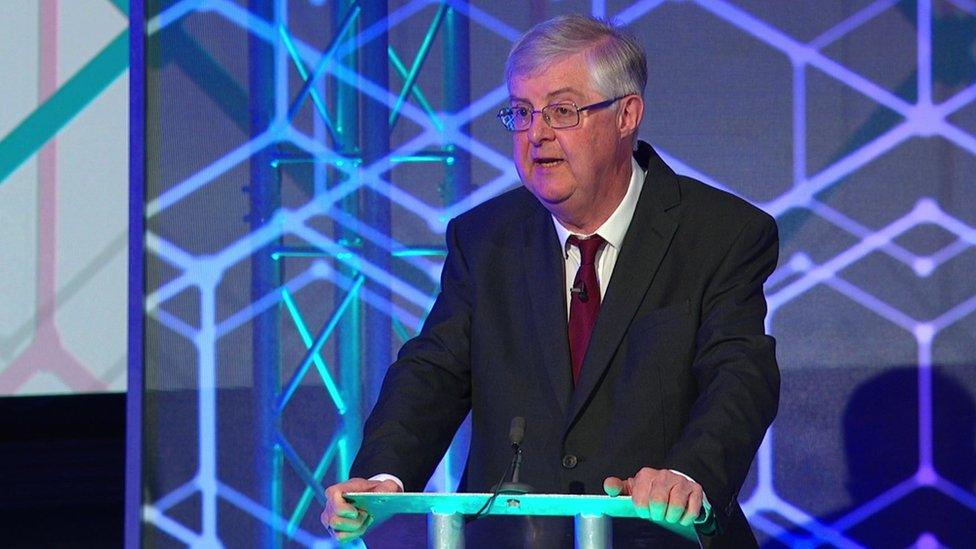
Mark Drakeford said £200m was available to businesses as a "down payment" after the election
"Why wait?" Mr Price said. "In England and Scotland there have been restart grants of up to £18,000, £19,000, which will be provided to hospitality businesses and others who have had to remain closed".
"It's a very simple reason, it's the rules don't allow it," Mr Drakeford said in response.
"If I was handing out cheques to businesses in Wales, Adam Price would be the first person calling foul."
Mr Price said that was not true, saying he called for a Senedd recall during the campaign and would have supported it.
Mr Davies said this was why he had called "back in February for a road map out of lockdown.
"So those announcement could have been made outside of the election period and that money made available to businesses across Wales."

WALES ELECTION: THE BASICS
What's happening? On 6 May, people will vote to elect 60 Members of the Senedd (MSs). The party that can command the support of a majority of MSs will form the Welsh government. Find out more here.
What powers does the Senedd have? MSs pass laws on aspects of life in Wales such as health, education and transport - and have some tax powers.

Jane Dodds said her party would support medium, small and micro-businesses, which she described as the "backbone" of the country.
"We want to freeze business rates, we want to be talking to people about what can replace those," she said.
"We want to go bigger, we want an economic development [plan] which looks at the whole of Wales, and how we can grow our economy and support small businesses".
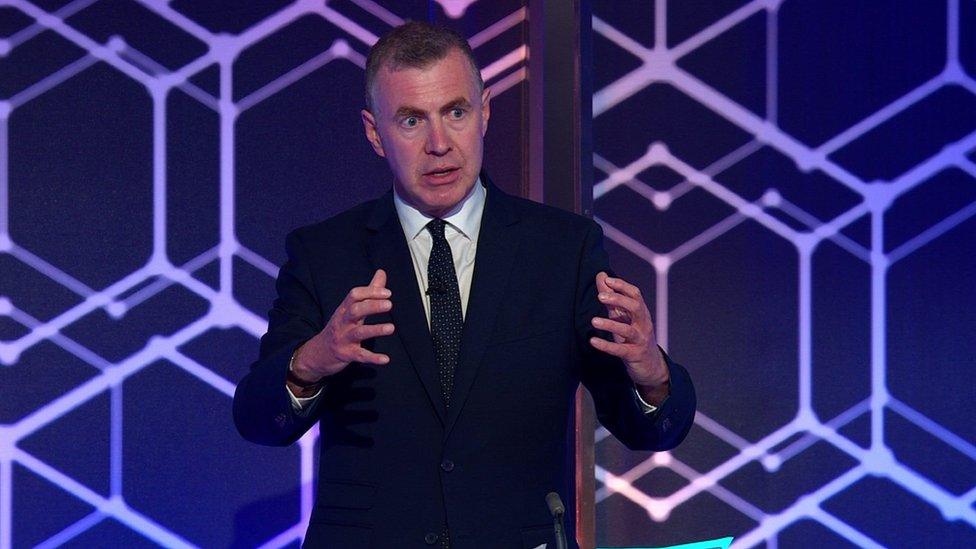
Adam Price questioned why the cash for firms could not have been made available before the election
Last month Plaid Cymru had called for ATWAP's Mr Suchorzewski to be dropped from the proceedings. During the debate his anti-devolution stance came under attack from his political rivals.
Mr Suchorzewski said the NHS in Wales had been "totally mismanaged" over the past 22 years.
He said that before the pandemic, five of Wales' health boards had been in special measures.
Mr Suchorzewski said control of the NHS should be returned to the UK government: "There should be one NHS for all - and it should be put under the guidance of the United Kingdom government."


Mark Drakeford was asked about why he couldn't distribute the £200m set aside for supporting businesses until after the election and he said: "The rules don't allow it - we're in an election period."
The time before an election - in this case the period since 25 March - is known as the "period of sensitivity" or "purdah", when there are restrictions on what ministers and civil servants are allowed to do.
The Welsh government's guidance says that during that period, in line with the ministerial code, ministers will not make announcements that "could be construed as conferring political advantage or electoral advantage", external.
But the guidance also recognises that, as a result of the pandemic, ministers "will need to continue making important decisions" and that "some of these decisions may inevitably be high profile and potentially sensitive".
So Mr Drakeford may be taking a cautious approach to the rules, especially as he could argue that supporting businesses hit by the pandemic was not a new policy initiative but an extension of an existing policy.

That led Mr Drakeford to accuse the Abolish the Welsh Assembly Party of "writing off everything our people have done over the last extraordinary 12 months".
"As we stand here today, Wales has the lowest rate of coronavirus anywhere in the United Kingdom and our vaccination programme is the most successful of any of the four UK nations," he said.
He admitted the UK government had done a good job in securing the supply of vaccines, but added: "Here in Wales, we have used that supply more effectively than anywhere else."
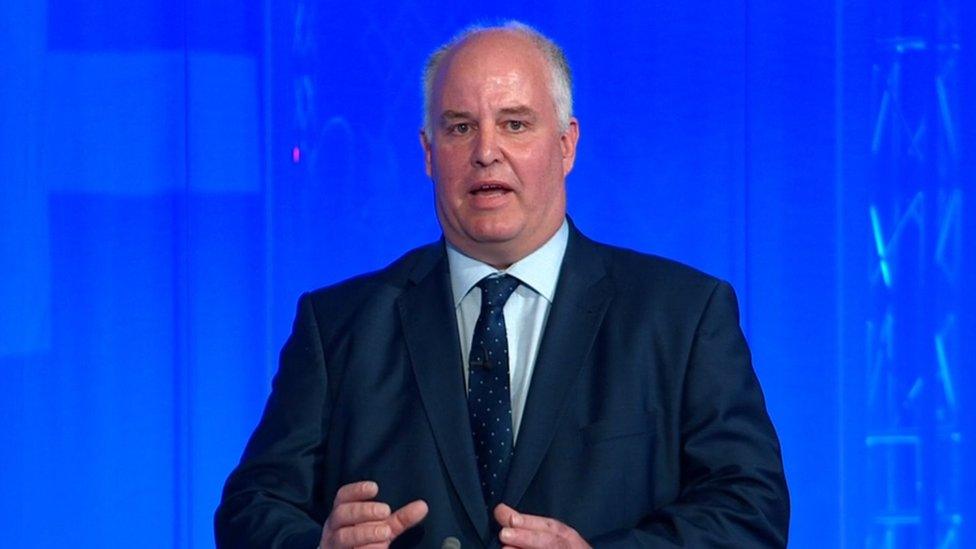
Andrew RT Davies said "if the rugby team isn't playing well you don't... pull it out of the competition"
After Mr Suchorzewski complained about the printing of letters in English and Welsh language for Covid-19 tests, Mr Price accused him of wanting to get rid of the Welsh language: "They don't want to abolish our parliament they want to abolish our language as well."
Mr Davies said: "If the rugby team isn't playing well you don't... pull it out of the competition, you change the management structure, you change the coach and you get the team performing."
At the other side of the constitutional debate, Mr Price said now was the time to start building towards a referendum on Welsh independence.
"By taking our future into our own hands, that's the way that we solve our problems, the solutions will never come from Westminster."
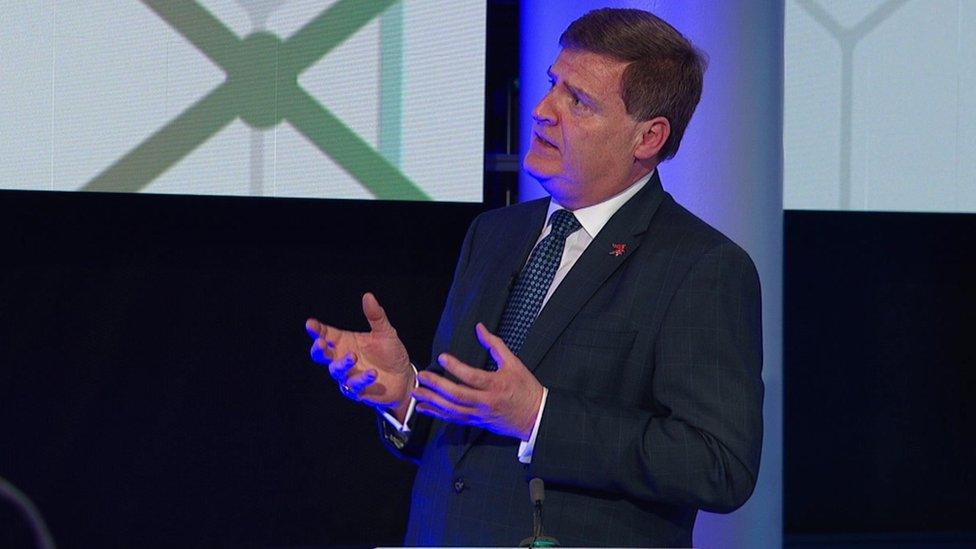
Richard Suchorzewski said the NHS had been mismanaged under devolution
Asked how Wales would have fared alone in dealing with Covid, Mr Price accused the UK government of stealing Covid tests from Wales: "We had tests that were ready to come to Wales, they were stolen by the UK government."
"Rubbish," said Mr Davies, adding Mr Price and ATWAP would cause "constitutional chaos... slapping on the table the independence referendum, and indeed the abolish referendum that would be required to do away with the Welsh Parliament".
Responding to a question about the row over the refurbishment of Boris Johnson's flat, the Welsh Tory Senedd leader said: "People aren't interested in the wallpaper in Downing Street, but they are interested in how they get an appointment at a GP's surgery".
He told the debate: "We can have a better education system, we can have a health service that responds to waiting times. We can create an economy that lifts wages across the whole of Wales and makes a difference."
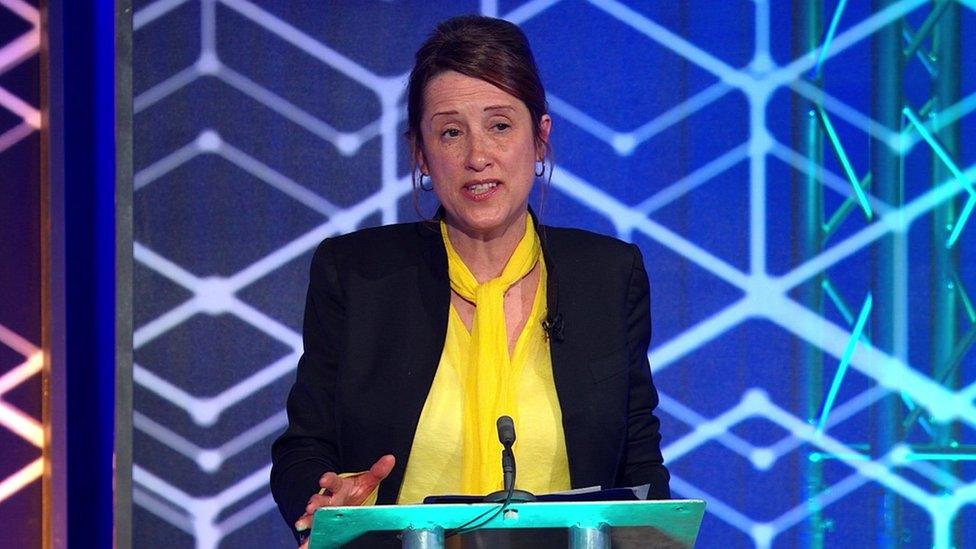
Jane Dodds said the Lliberal Democrats wanted to put "the climate at the heart of everything".
Jane Dodds said Wales should have the same level of devolution as Scotland.
She said "we don't need independence" and instead time should be spent on creating jobs and protecting health.
She called on voters to "imagine" a better Wales.
Ms Dodds added that the Liberal Democrats wanted to "put the climate at the heart of everything, and would "put recovery first" and prioritise the economy and mental health.
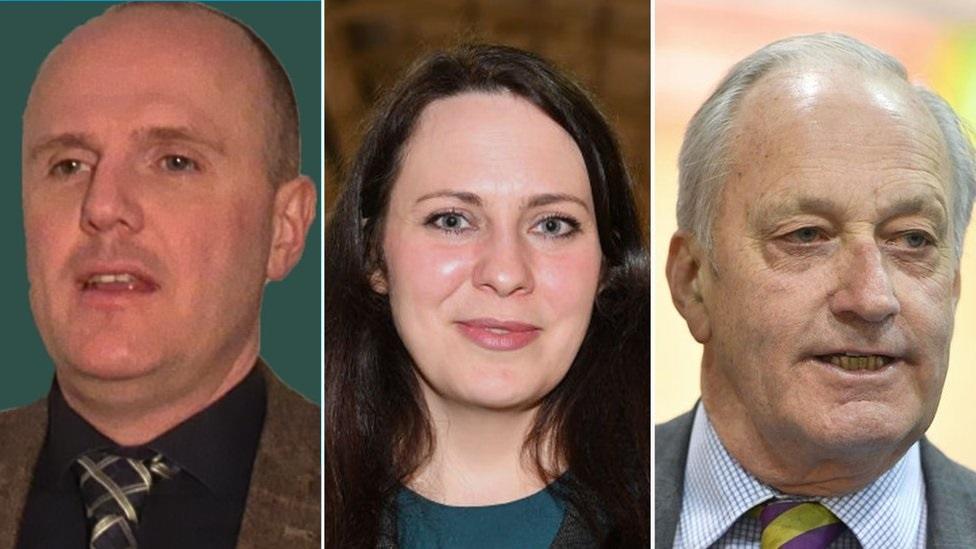
Jamie Jenkins of Reform UK, Amelia Womack of the Green Party and Neil Hamilton from UKIP also appeared in the programme
Reform UK, UKIP and the Greens also took part in a three-way debate.
For Reform UK, Jamie Jenkins said his party was against further Covid lockdowns.
He claimed the majority of people now have antibodies and the successful rollout of the vaccine means restrictions are no longer necessary.
For UKIP, Neil Hamilton said: "The idea that the Senedd in any way represents ordinary people in Wales is nonsense".
He said Wales was the poorest part of the UK: "We're poorer today than 22 years ago. We've had a permanent Labour government and we're going to get a Labour government again after the sixth of May, because Plaid Cymru are already cosying up to Mark Drakeford."
Amelia Womak from the Green Party says that a vote for green jobs is a vote to "rebuild a post pandemic Wales fit for the 21st century."
Asked how she would rebuild the economy while guarding the environment, Ms Womak said that "all of our recovery should have the environment at the heart of it, because it means jobs and opportunities it means training and education, and it means that we're tackling the biggest problems of our time."


A five way debate is unlikely ever to produce an outright winner.
But it is very easy to come unstuck in this format - and the leaders avoided any big mistakes.
Their supporters will each find things to applaud and this will have given them some added momentum going into the final week of the campaign.
For undecided voters the debate gave a decent flavour of what the parties are about - what does that mean for polling day? We'll find out soon.

POLICY GUIDE: Who should I vote for?
FIRST TIME: Will 16-year-olds vote?

Related topics
- Published29 April 2021
